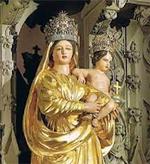Fathers of the Church
From His Epistle to Victor and the Roman Church Concerning the Day of keeping the Passover
by Polycrates, Bishop of Ephesus in 130-196 A.D. | translated by Rev. B. P. Pratten
As for us, then, we scrupulously observe the exact day, neither adding nor taking away. For in Asia great luminaries have gone to their rest, who shall rise again in the day of the coming of the Lord, when He cometh with glory from heaven and shall raise again all the saints. I speak of Philip, one of the twelve apostles, who is laid to rest at Hierapolis; and his two daughters, who arrived at old age unmarried; his other daughter also, who passed her life under the influence of the Holy Spirit, and reposes at Ephesus; John, moreover, who reclined on the Lord's bosom, and who became a priest wearing the mitre, and a witness and a teacher—he rests at Ephesus. Then there is Polycarp, both bishop and martyr at Smyrna; and Thraseas from Eumenia, both bishop and martyr, who rests at Smyrna. Why should I speak of Sagaris, bishop and martyr, who rests at Laodicea? of the blessed Papirius, moreover? and of Melito the eunuch, who performed all his actions under the influence of the Holy Spirit, and lies at Sardis, awaiting the visitation from heaven, when he shall rise again from the dead? These all kept the passover on the fourteenth day of the month, in accordance with the Gospel, without ever deviating from it, but keeping to the rule of faith.
Moreover I also, Polycrates, who am the least of you all, in accordance with the tradition of my relatives, some of whom I have succeeded—seven of my relatives were bishops, and I am the eighth, and my relatives always observed the day when the people put away the leaven — I myself, brethren, I say, who am sixty-five years old in the Lord, and have fallen in with the brethren in all parts of the world, and have read through all Holy Scripture, am not frightened at the things which are said to terrify us. For those who are greater than I have said, "We ought to obey God rather than men." ...
I might also have made mention of the bishops associated with me, whom it was your own desire to have called together by me, and I called them together: whose names, if I were to write them down, would amount to a great number. These bishops, on coming to see me, unworthy as I am, signified their united approval of the letter, knowing that I wore these grey hairs not in vain, but have always regulated my conduct in obedience to the Lord Jesus.
Taken from "The Early Church Fathers and Other Works" originally published by Wm. B. Eerdmans Pub. Co. in English in Edinburgh, Scotland, beginning in 1867. (ANF 8, Roberts and Donaldson). The digital version is by The Electronic Bible Society, P.O. Box 701356, Dallas, TX 75370, 214-407-WORD.






